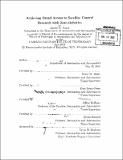Achieving broad access to satellite control research with zero robotics
Author(s)
Katz, Jacob G
DownloadFull printable version (22.98Mb)
Other Contributors
Massachusetts Institute of Technology. Department of Aeronautics and Astronautics.
Advisor
David W. Miller.
Terms of use
Metadata
Show full item recordAbstract
Since operations began in 2006, the SPHERES facility, including three satellites aboard the International Space Station (ISS), has demonstrated many future satellite technologies in a true microgravity environment and established a model for developing successful ISS payloads. In 2009, the Zero Robotics program began with the goal of leveraging the resources of SPHERES as a tool for Science, Technology, Engineering, and Math education through a unique student robotics competition. Since the first iteration with two teams, the program has grown over four years into an international tournament involving more than two thousand student competitors and has given hundreds of students the experience of running experiments on the ISS. Zero Robotics tournaments involve an annually updated challenge motivated by a space theme and designed to match the hardware constraints of the SPHERES facility. The tournament proceeds in several phases of increasing difficulty, including a multi-week collaboration period where geographically separated teams work together through the provided tools to write software for SPHERES. Students initially compete in a virtual, online simulation environment, then transition to hardware for the final live championship round aboard the ISS. Along the way, the online platform ensures compatibility with the satellite hardware and provides feedback in the form of 3D simulation animations. During each competition phase, a continuous scoring system allows competitors to incrementally explore new strategies while striving for a seat in the championship. This thesis will present the design of the Zero Robotics competition and supporting online environment and tools that enable users from around the world to successfully write computer programs for satellites. The central contribution is a framework for building virtual platforms that serve as surrogates for limited availability hardware facilities. The framework includes the elaboration of the core principles behind the design of Zero Robotics along with examples and lessons from the implementation of the competition. The virtual platform concept is further extended with a web-based architecture for writing, compiling, simulating, and analyzing programs for a dynamic robot. A standalone and key enabling component of the architecture is a pattern for building fast, high fidelity, web-based simulations. For control of the robots, an easy to use programming interface for controlling 6 degree-of-freedom (6DOF) satellites is presented, along with a lightweight supervisory control law to prevent collisions between satellites without user action. This work also contributes a new form of student robotics competition, including the unique features of model-based online simulation, programming, 6DOF dynamics, a multi-week team collaboration phase, and the chance to test satellites aboard the ISS. Scoring during the competition is made possible by possible by a game-agnostic scoring algorithm, which has been demonstrated during a tournament season and improved for responsiveness. Lastly, future directions are suggested for improving the tournament including a detailed initial exploration of creating open-ended Monte Carlo analysis tools.
Description
Thesis (Ph. D.)--Massachusetts Institute of Technology, Dept. of Aeronautics and Astronautics, 2013. This thesis was scanned as part of an electronic thesis pilot project. Cataloged from PDF version of thesis. Includes bibliographical references (p. 307-313).
Date issued
2013Department
Massachusetts Institute of Technology. Department of Aeronautics and AstronauticsPublisher
Massachusetts Institute of Technology
Keywords
Aeronautics and Astronautics.